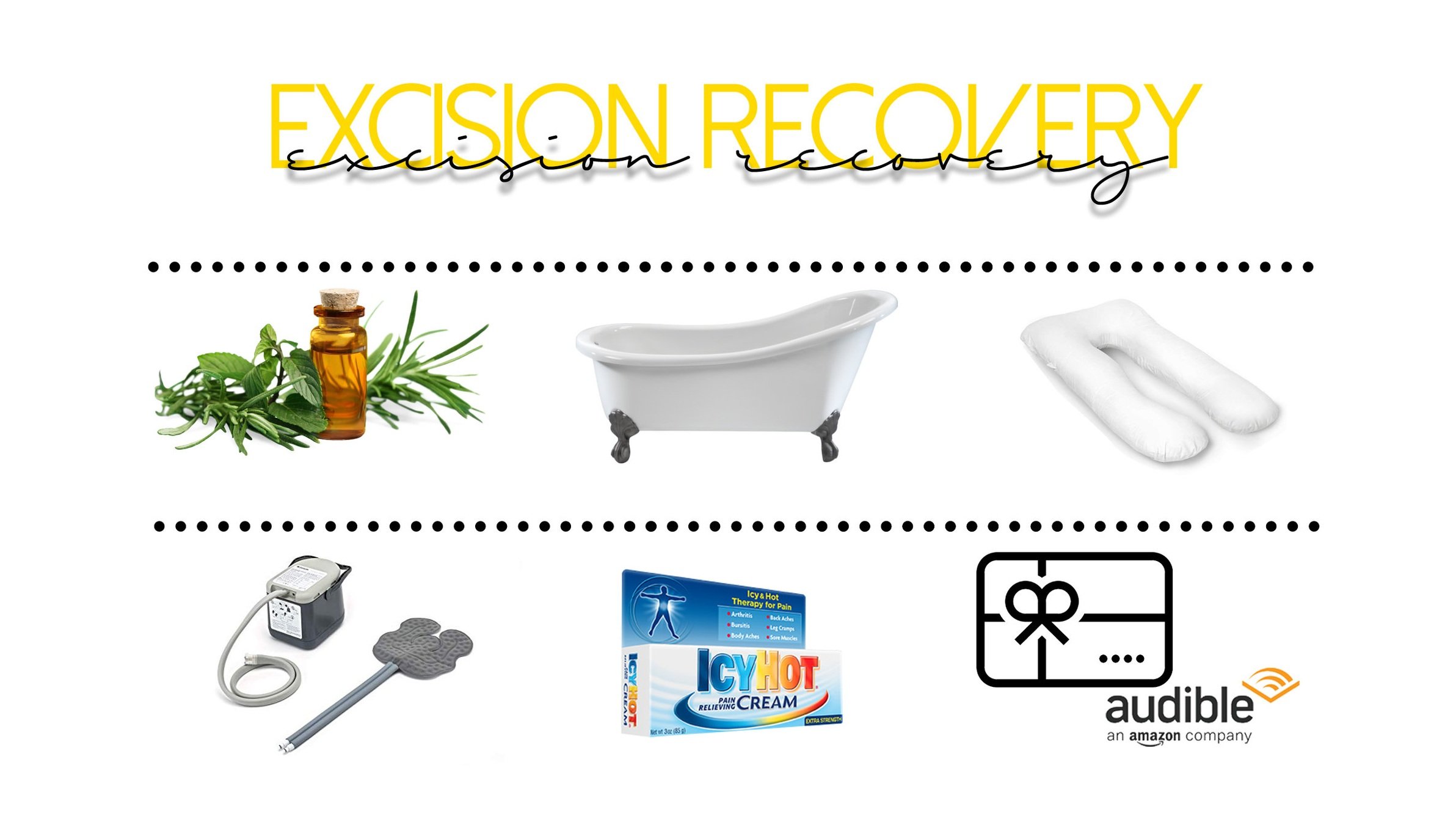Excision surgery is considered the “Golden Standard” in the treatment of endometriosis, and from personal experience, it can be life-changing. Before excision, I was living on my heating pad, stuck in bed 3 weeks out of the month. I am now at 1.5 years post-op and feel like a new person! My inflammation markers (CA-125) have gone down from 400 to well within “normal” range, but most importantly, I have my life back. My periods are not a big deal and I have minor cramping, and I have very minimal general pelvic pain (due to IC) throughout the month. You could even say I have positive periods ;) I do still get a pretty crazy bloat going when I eat certain foods, but it feels less period-affected than before.
Now for the less pleasant part of excision; recovery. My recovery was around 3 months of time that I needed to be off work, 2 more months to be able to do most physical activities beyond grocery shopping, and about 7-8 months total to feel like a “normal” person. Part of that was probably due to the extent of my disease (deep invasive stage IV, or stage V depending on what scoring you use) and another complication in my recovery (that I did not discover until after) is that I have had chronic Lyme disease. I also had to have a bowel resection, which is rare! This means that a few inches of my lower intestine were removed because endometriosis had infiltrated too much of the organ. I have had a few friends get excision surgery after me and they had significantly better recoveries (and none of them had bowel resections)! So it just depends on what your body is dealing with. Even with an intense recovery, my surgery was 100% worth it because today I am able to exercise, travel, and be spontaneous; whether I am on my period or not!
Here are some things that were essential in my excision recovery! As always, check with your excision specialist with any of my recommendations that might affect your recovery.
A hot bath - My surgeon allowed me to take baths as soon as I was released from the hospital and I basically lived in my tub after that! While my incision sites were healing, I didn’t add anything to the water, but as they closed I added Epsom salts and essential oils (sometimes I added CBD oil as well). Excision surgery is SO in-depth that it can trigger pelvic floor spasms. For me, the only relief I found from this pain was a hot bath.
Pelvic floor yoga - This is something that I would personally hold off on for at least 3 months. The baths will help your pelvic floor muscles to relax, but once you start going out more and walking around a bit, it is so important to help teach your pelvic floor how to stay relaxed and peaceful. This really relieved a lot of my post-op pain when combined with an anti-spasmodic bladder medication my doctor prescribed. Here is a link to a video that I followed.
Pregnancy pillow - It can be difficult to sleep when you are sore from surgery! I purchased this pregnancy pillow (here) for my recovery and it was SO helpful with getting in a comfortable position and not accidentally hurting myself in my sleep.
Icy Hot - Laying in bed for several weeks can lead to a sore back and legs. I found that using icy-hot was really helpful in reducing some of those aches and pains. If you can find a mentholated CBD balm, even better as it will help with inflammation!
Ice machine - A few years before my excision surgery, I had joint repair surgery on my hip. That surgery helped me discover the magic of the ice machine! The machine keeps the water cold enough to offer significant pain relief but not so cold that you are at risk for frostbite. I recycled my machine and used it steadily for at least a month following my surgery. Immediately following surgery, I was recommended not to put heat on my abdomen, so the ice machine was a lifesaver. You can usually rent one from the hospital where you get surgery, but you can also purchase one here (I promise it is worth the price tag).
Say no to constipation! - Let’s get real, the combination of pain relievers, having your intestines cut, and having sensitive pelvic floor muscles after surgery does not make for an easy time with digestion. And from personal experience, you do NOT want to be constipated after surgery. Taking supplements that support a smooth moving digestion process will help, but I would recommend having some milk of magnesia or magnesium citrate on hand. They don’t taste great, and they don’t feel great while they are working, but they can really relieve a lot of pain and pressure. All of that magnesium going through your system can be a literal pain in the butt tho (sorry y’all, but this is important info!). Having some baby wipes and some sort of relieving cream like A&D or Preparation H will be a big help.
Stay positive - Laying in bed for a few months can be extremely boring and isolating! Make sure you keep in touch with friends on social media for the months when you aren’t ready for visitors. Connecting with an endo support page on Instagram or Facebook is a game-changer in your recovery process. Having other ladies I could reach out to and ask even the most TMI questions to helped relieve a lot of sadness. I also listened to lots of audiobooks! Getting an Audible plan for the months of recovery can help make the rest a little easier. The pain medication I was on made me feel very anxious, so having something to listen to while I fell asleep really helped calm my mind.

